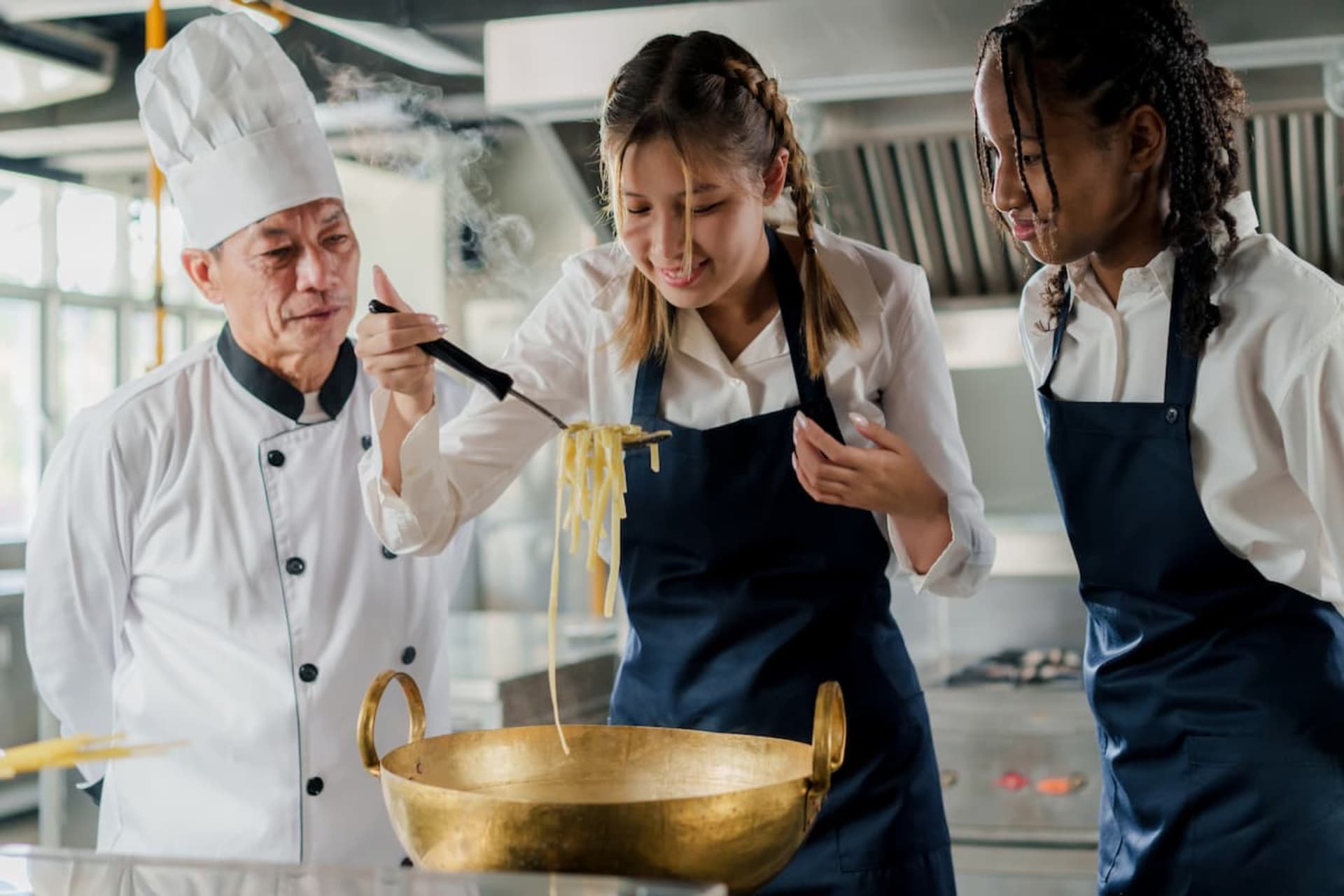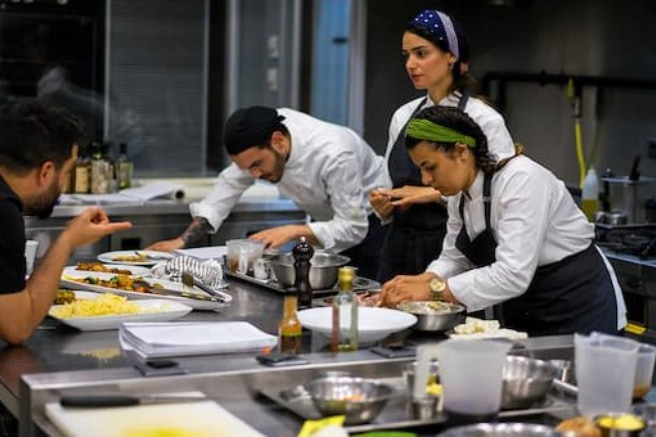Finding specialized culinary education that matches your goals

As an aspiring chef, you may often hear about successful cooks who have risen to prominence without formal school degrees. They might have gained experience growing up in a family restaurant business or simply had the right mix of drive and luck. But for many chefs, pursuing a culinary education is the best way to acquire essential skills. These programs teach students about ingredients and food preparation and cover crucial aspects such as timing, scaling recipes for large groups and managing costs while sourcing high-quality ingredients. Graduating from a prestigious culinary institution can improve job prospects and potentially increase your starting salary by 20%.
But how can you determine which culinary school suits you best? This article will show you how to find the ideal training program for your dream career.
What are the benefits of a culinary education?
If you have a passion for cooking, studying at a professional school offers many advantages, propelling you toward a fulfilling career in the culinary arts and preparing you for life as a chef. Some of the benefits include:
-
Skill development: culinary arts programs provide a structured environment to hone essential skills under the guidance of experienced chefs. You'll master knife skills, pastry arts, French cooking techniques and food safety protocols, building a strong foundation for success in professional kitchens
-
Broadened knowledge: the right training equips you with valuable business insights beyond technical skills. You'll learn about kitchen management, menu planning and cost control, all essential for navigating the restaurant industry. Many programs also offer courses in food science, nutrition and history, enriching your understanding of the culinary world
-
Career opportunities: a degree unlocks a variety of exciting career paths. Graduates can pursue positions in restaurants, catering companies or even food production facilities. Some may specialize in baking and pastry arts or food styling. Earning a culinary degree can also be a stepping stone to owning your own restaurant or food business
-
Industry network: through culinary education, you can develop strong connections in the food industry. You'll interact with instructors who are experienced professionals and potentially build relationships with classmates who could become future colleagues. These connections can be invaluable when seeking employment or exploring new opportunities
-
Confidence and creativity: mastering techniques frees you to develop your own signature dishes and push culinary boundaries. This confidence and creativingy can translate into a successful and fulfilling career
-
Personal growth: the culinary arts offer a constant learning curve. The right education provides the foundation and framework for lifelong learning, allowing you to stay current with food industry trends and continuously refine your chef skills

Exploring culinary education options
There are many ways of pursuing training and perfecting your cooking skills, each tailored to different career goals, interests and learning styles:
-
Degrees in culinary arts: provide a comprehensive foundation in kitchen skills and knowledge. The full curriculum typically covers topics such as sanitation, cooking techniques, menu planning and team management
-
Diplomas: these programs are shorter and more focused, often lasting six months to a year. They are ideal for those who want to specialize in a particular area, such as baking or vegetarian cuisine
-
Certificates: the shortest form of culinary education, usually lasting a few weeks or months. They teach specific skills, such as knife work, bread baking or food styling
-
Apprenticeships: provide a unique opportunity to learn from experienced chefs in a professional kitchen setting. While apprenticeships may not provide formal classroom instruction, they offer valuable hands-on experience
-
Online courses: offer flexibility and convenience, allowing you to learn at your own pace and schedule. However, they may not provide the same practical experience as traditional programs
-
Pastry and baking programs: specialized courses focusing on the art and science of patisserie, offering skills in creating desserts, breads and pastries. These can be standalone or part of a broader culinary arts curriculum
Who is suited to culinary school?
This type of education is for anyone with a passion for food and a desire to learn. It's ideal for people who are:
-
Creative: those who have a flair for creativity and enjoy experimenting with flavors, textures and presentations to craft unique dining experiences
-
Aspiring chefs: students who want to lead kitchens, create menus and master the technical skills necessary to excel in the culinary industry
-
Career changers: professionals looking to pivot into the food industry, driven by a desire to pursue a more hands-on, creative career path
-
Entrepreneurs: individuals with ambitions to start a restaurant business, catering service or food product development company
-
Team players: aspiring chefs who thrive in collaborative environments, as culinary school often involves working closely with instructors and peers in a kitchen setting
-
Detail oriented: people who appreciate the precision and attention to detail required in culinary arts, from measuring ingredients to perfecting cooking techniques
-
Lifelong learners: culinary school can be an ideal choice if you have a deep love for food and a desire to learn and experiment in the kitchen. The structured curriculum provides a supportive environment to nurture your passion and refine your skills
-
Career driven: a culinary degree demonstrates commitment and equips you with the necessary skills and knowledge. It can open doors to exciting job opportunities and give you a competitive edge in the industry
If you have a passion for food and wish to pursue a career in the food and beverage sector, earning a culinary arts degree is the perfect starting point.
Choosing the right culinary education
When considering your options for training, look for a program that aligns with your learning style and career goals. Things to look out for include:
-
Program focus and specialization: evaluate each course's specific modules, whether it's culinary arts, French pastry arts, hospitality management or international cuisine. Choose based on your interests and career aspirations
-
Curriculum and courses: ensure the program covers practical kitchen skills, theoretical knowledge and industry-related topics such as menu planning, food safety and culinary trends. Look for options that offer hands-on experience in well-equipped kitchens
-
Accreditation and reputation: check if the school is accredited by educational bodies or endorsed by renowned chefs and industry professionals. A reputable school often indicates quality education and leads to better career prospects
-
Faculty and instructors: research the credentials and experience of the tutors. Experienced chefs and instructors with industry backgrounds can provide valuable insights and mentorship.
-
Facilities and resources: visit the campus or explore virtual tours to assess the quality of kitchens, libraries and other resources. Adequate resources improve your learning experience and preparation for real-world challenges. If you can, speak to current students about their experiences at the school
-
Internship opportunities: schools that offer placements can help you gain practical experience and establish professional contacts
-
Cost and financial aid: consider tuition fees, additional costs (such as supplies and uniforms) and what financial aid or scholarships are available. Balance the cost with the potential return on investment regarding career advancement and earning potential
-
Align your goals: think about your culinary interests and career aspirations. Once you understand your goals, research specializations such as restaurant management or pastry arts to find a program that aligns with your vision
-
Class size and schedule: think about the learning environment that best suits you. Smaller class sizes allow for more personalized attention from instructors. Consider the program schedule. For instance, think whether full-time engagement or a part-time course would best fit your lifestyle
Culinary careers after training
An education from a French culinary institute or other cookery school unlocks many exciting career paths you can pursue in the food and hospitality industries. These include:
-
Chef: work in restaurants, hotels or catering companies, overseeing kitchen operations, creating menus and managing culinary teams
-
Pastry chef: specialize in baking and pastry arts, crafting desserts, pastries and breads for bakeries, restaurants or patisseries
-
Sous chef: assist head chefs in kitchen management, food preparation and menu planning, preparing you for eventual leadership roles
-
Catering manager: organize and manage food service for events, from weddings to corporate functions, ensuring seamless execution and client satisfaction
-
Food and beverage manager: oversee dining establishments' food and beverage operations, including inventory management, staff supervision and customer service
-
Restaurant manager: manage daily restaurant operations, including staffing, budgeting and customer relations, ensuring smooth service and profitability
-
Food stylist: work in media and advertising, preparing food for photography or film to look visually appealing and enticing
-
Food writer or critic: combine culinary knowledge with writing skills to review restaurants, create recipes or contribute to food publications and blogs
-
Private chef: prepare personalized meals for individuals or families, often in private homes or as part of exclusive events
-
Food entrepreneur: start your own food business, such as a food truck, bakery, specialty food shop or catering service, using your culinary skills and creativity
-
Restaurant positions: graduates can pursue roles such as line cook, head chef or sous chef or manage their own restaurant
-
Catering and events: catering companies offer plenty of different opportunities. You could create menus for weddings, corporate functions or social gatherings. This path allows for creativity and the chance to showcase your culinary skills in different settings
-
Teaching and instruction: sharing your knowledge can be a fulfilling career choice. With experience, you could become an instructor at a vocational school or even teach private cooking classes
Conclusion
Selecting the appropriate culinary education ca lead to a successful and rewarding chef career. A structured program offers more than just technical skills; it provides essential business acumen, industry connections and personal growth opportunities. From fundamental cooking techniques to understanding the intricacies of kitchen management, the right education equips you with the tools necessary to excel in the competitive world of food service.
Look for courses that balance practical kitchen training with theoretical knowledge and consider the faculty's expertise, school accreditation and available resources. Internships and industry placements can also provide invaluable experience to strengthen your readiness for the workforce. After graduation, the food and beverage field offers a broad spectrum of career paths, from traditional roles such as chef and sous chef to specialized positions in pastry arts, food styling and education. By choosing the right program that aligns with your goals and interests, you'll be well on your way to launching a fulfilling career in the culinary arts.


